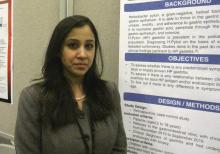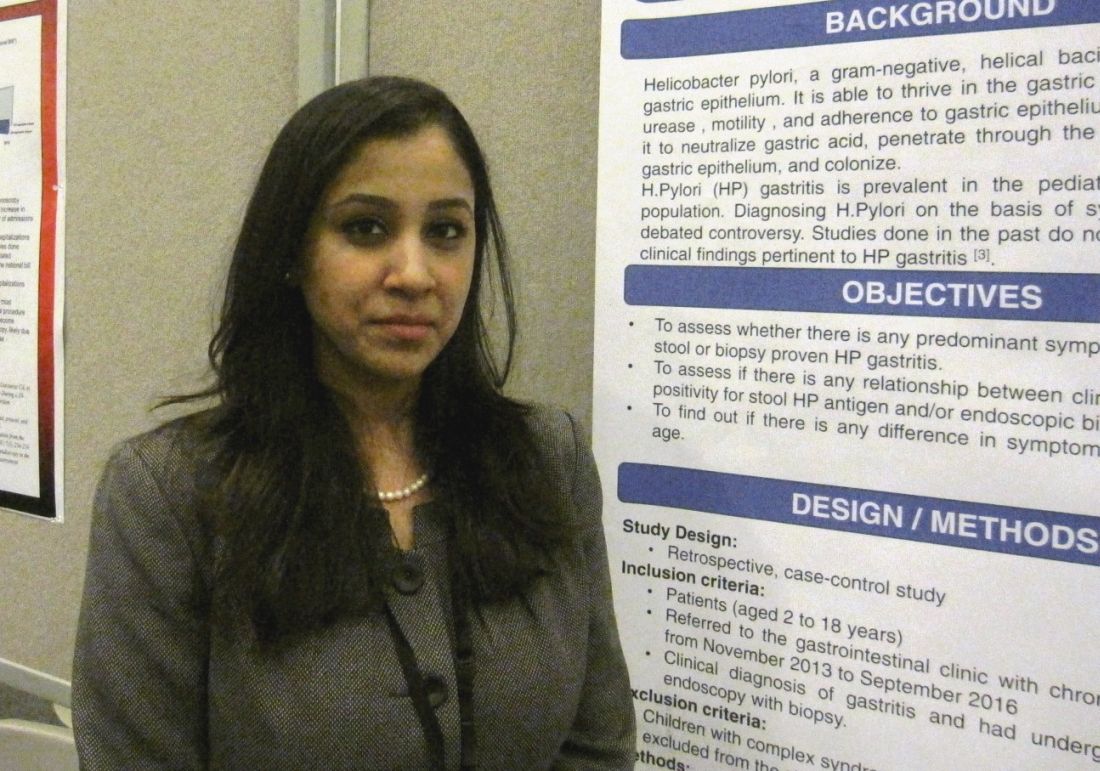User login
SAN FRANCISCO – Infants refractory constipation and chronic abdominal pain should be tested for the presence of Helicobacter pylori infection. Just relying on the detection of antigen to H. pylori in stool may not be a definitive indicator of the bacterial infection; endoscopic biopsy is a more specific test, according to study findings presented at the Pediatric Academic Societies meeting.
“Our study highlights that constipation seems to be prevalent among children who test positive for H. pylori in stool. No other predominant symptom was found to be related to H. pylori infection,” said Ayesha Baig, MD, a third-year resident at Brookdale University Hospital and Medical Center in Brooklyn, N.Y.
Gastritis that results from H. pylori infection in the mucous membrane lining the stomach is extremely common in children and adolescents. Yet, diagnosis remains challenging, with disagreement about the hallmark symptoms to look for in making the diagnosis.
The researchers retrospectively examined the medical records of patients aged 2-18 years who had been treated for chronic abdominal pain at the hospital’s gastrointestinal clinic between late 2013 and mid-2016. One aim was to see if there was a predominant symptom in patients in whom H. pylori infection had been proven by the detection of antibody to the bacteria in stool and/or in an endoscopic biopsy. Other aims were to identify a relationship between symptoms and the two methods of detecting H. pylori, and to see if symptoms varied with age. Other gastrointestinal disorders were not considered.
The majority (60%) of the 91 patients were male. Most were African American. Their mean age was 10-12 years.
The presence of nausea, vomiting, diarrhea, constipation, blood in stool, and prior history of use of proton pump inhibitors were compared in those testing positive and negative for H. pylori.
Of the patients who were constipated, 72% tested positive for H. pylori in stool and 28% of tested positive for H. pylori in endoscopic biopsy. In patients testing positive for H. pylori based on the presence of antigen in the stool, about 40% tested negative using endoscopic biopsy.
Age was irrelevant concerning biopsy results and symptoms.
“A proportion of patients who tested positive for H. pylori stool antigen tested negative for H. pylori using endoscopic biopsy, which is a higher-specificity method. Our study indicated that stool antigen alone is not a definitive indicator for treating H. pylori,” said Dr. Baig.
The influence of empiric treatment is still an open question that needs examination.
Dr. Baig reported having no relevant financial disclosures.
*This article was updated on 5/24/2017.
SAN FRANCISCO – Infants refractory constipation and chronic abdominal pain should be tested for the presence of Helicobacter pylori infection. Just relying on the detection of antigen to H. pylori in stool may not be a definitive indicator of the bacterial infection; endoscopic biopsy is a more specific test, according to study findings presented at the Pediatric Academic Societies meeting.
“Our study highlights that constipation seems to be prevalent among children who test positive for H. pylori in stool. No other predominant symptom was found to be related to H. pylori infection,” said Ayesha Baig, MD, a third-year resident at Brookdale University Hospital and Medical Center in Brooklyn, N.Y.
Gastritis that results from H. pylori infection in the mucous membrane lining the stomach is extremely common in children and adolescents. Yet, diagnosis remains challenging, with disagreement about the hallmark symptoms to look for in making the diagnosis.
The researchers retrospectively examined the medical records of patients aged 2-18 years who had been treated for chronic abdominal pain at the hospital’s gastrointestinal clinic between late 2013 and mid-2016. One aim was to see if there was a predominant symptom in patients in whom H. pylori infection had been proven by the detection of antibody to the bacteria in stool and/or in an endoscopic biopsy. Other aims were to identify a relationship between symptoms and the two methods of detecting H. pylori, and to see if symptoms varied with age. Other gastrointestinal disorders were not considered.
The majority (60%) of the 91 patients were male. Most were African American. Their mean age was 10-12 years.
The presence of nausea, vomiting, diarrhea, constipation, blood in stool, and prior history of use of proton pump inhibitors were compared in those testing positive and negative for H. pylori.
Of the patients who were constipated, 72% tested positive for H. pylori in stool and 28% of tested positive for H. pylori in endoscopic biopsy. In patients testing positive for H. pylori based on the presence of antigen in the stool, about 40% tested negative using endoscopic biopsy.
Age was irrelevant concerning biopsy results and symptoms.
“A proportion of patients who tested positive for H. pylori stool antigen tested negative for H. pylori using endoscopic biopsy, which is a higher-specificity method. Our study indicated that stool antigen alone is not a definitive indicator for treating H. pylori,” said Dr. Baig.
The influence of empiric treatment is still an open question that needs examination.
Dr. Baig reported having no relevant financial disclosures.
*This article was updated on 5/24/2017.
SAN FRANCISCO – Infants refractory constipation and chronic abdominal pain should be tested for the presence of Helicobacter pylori infection. Just relying on the detection of antigen to H. pylori in stool may not be a definitive indicator of the bacterial infection; endoscopic biopsy is a more specific test, according to study findings presented at the Pediatric Academic Societies meeting.
“Our study highlights that constipation seems to be prevalent among children who test positive for H. pylori in stool. No other predominant symptom was found to be related to H. pylori infection,” said Ayesha Baig, MD, a third-year resident at Brookdale University Hospital and Medical Center in Brooklyn, N.Y.
Gastritis that results from H. pylori infection in the mucous membrane lining the stomach is extremely common in children and adolescents. Yet, diagnosis remains challenging, with disagreement about the hallmark symptoms to look for in making the diagnosis.
The researchers retrospectively examined the medical records of patients aged 2-18 years who had been treated for chronic abdominal pain at the hospital’s gastrointestinal clinic between late 2013 and mid-2016. One aim was to see if there was a predominant symptom in patients in whom H. pylori infection had been proven by the detection of antibody to the bacteria in stool and/or in an endoscopic biopsy. Other aims were to identify a relationship between symptoms and the two methods of detecting H. pylori, and to see if symptoms varied with age. Other gastrointestinal disorders were not considered.
The majority (60%) of the 91 patients were male. Most were African American. Their mean age was 10-12 years.
The presence of nausea, vomiting, diarrhea, constipation, blood in stool, and prior history of use of proton pump inhibitors were compared in those testing positive and negative for H. pylori.
Of the patients who were constipated, 72% tested positive for H. pylori in stool and 28% of tested positive for H. pylori in endoscopic biopsy. In patients testing positive for H. pylori based on the presence of antigen in the stool, about 40% tested negative using endoscopic biopsy.
Age was irrelevant concerning biopsy results and symptoms.
“A proportion of patients who tested positive for H. pylori stool antigen tested negative for H. pylori using endoscopic biopsy, which is a higher-specificity method. Our study indicated that stool antigen alone is not a definitive indicator for treating H. pylori,” said Dr. Baig.
The influence of empiric treatment is still an open question that needs examination.
Dr. Baig reported having no relevant financial disclosures.
*This article was updated on 5/24/2017.
AT PAS 17
Key clinical point:
Major finding: Seventy-two percent and 28% of patients who were constipated tested positive for H. pylori in stool and in endoscopic biopsy, respectively.
Data source: Retrospective case-control study from a single medical center.
Disclosures: Dr. Baig reported having no relevant financial disclosures.

